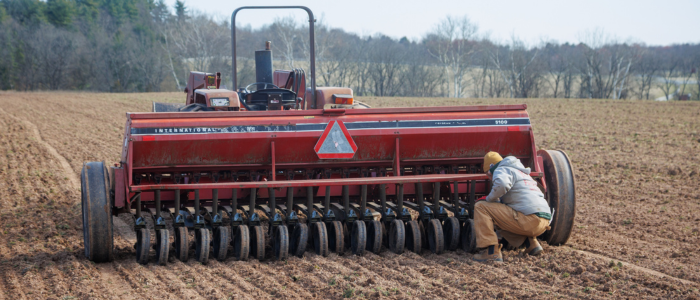The State We're In
The “Good Grain” movement
By Alison Mitchell, Executive Director, New Jersey Conservation Foundation
When we imagine local food, we might picture sun-ripened Jersey tomatoes or a table of produce at the weekend farmers market. But what about the bread for our sandwiches, the oats in our granola, or the flour in our Sunday morning pancakes? Grains are the foundation of most American diets, and yet they’re often left out of the conversation around local, healthy food.
Good Grain, a new documentary produced in partnership with the Northeast Organic Farming Association of New Jersey (NOFA-NJ), offers a fresh look at sustainable agriculture – which seeks a balance between food production, a healthy environment, and the well-being of those involved – through the story of growing and processing grain. The film captures golden fields of waving wheat, rustic sacks of flour, and the quiet, methodical work of people reimagining what local food can be. The result is a visual feast that serves as a reminder of the abundance Earth provides when we work in concert – rather than in combat – with natural systems.
“Growing grain organically seems like the next step for the sustainable agriculture movement,” says Jared Flesher, Good Grain filmmaker. Comparing it to other crops like vegetables, he notes, “You need a little more land, a little more equipment, and you need a mill. You also need a market.”
Facilities dedicated to cleaning, drying, storing, and milling grain have vanished at the local level. Without access to that infrastructure, small-scale organic farmers who grow grain struggle to bring their crops to market.
“Most grain in New Jersey is grown conventionally and sold into the global commodity system,” says Devin Cornia, Executive Director of NOFA-NJ. “There’s a real desire among farmers to grow organically and serve local markets but the processing system just isn’t there yet. That’s what Good Grain is about – rebuilding that lost middle.”
Good Grain introduces us to players at every step from the farm to the table; one of the Farmers (Morganics Family Farm), the Miller (River Valley Community Grains), the Maltster – yes, that’s a thing! – (Rabbit Hill Malt), the Baker (Sourland Bread), and last – but certainly not least – the Brewer (Chilton Mill Brewing).
The industry typically uses heavy applications of synthetic fertilizers, pesticides, and herbicides like Roundup. Unfortunately, those chemicals are linked to soil degradation, loss of biodiversity, and severe health risks for humans. In contrast, the farmers featured in Good Grain work to build healthy soil and embrace older, hardier varieties of grain like einkorn that thrive without chemicals.
Making the switch to local grain requires a leap of faith. “Farming is already inherently risky,” says Cornia. “You could plant the right seed, care for the soil, steward the land, and then have a weather event, a pest, a disease, and it’s all gone. So asking farmers to take on even more risk by switching practices, or entering an uncertain market, is a massive ask.”
Yet, the rewards for society are profound. Local grain can be a good boost to local economies, and it fosters healthier eating habits and protects our environment by protecting soil and water while reducing harm to wildlife.
As consumers, we can help build momentum for this new movement by seeking out local grains to add to our diets. See if you can pick up a little einkorn or whole wheat flour at a farmers’ market, and get creative in the kitchen. There are also a number of smaller bakeries springing up that make and sell bread prepared from local grains.
Good Grain premieres this month at the Pinelands Preservation Alliance and will tour the state in 2026. Eventually, the film will be released online for free. Check out nofanj.org/goodgrain to find information about where to buy local grain, upcoming classes and events, and more.
To learn more about how you can help preserve New Jersey’s natural resources, visit the New Jersey Conservation Foundation at www.njconservation.org or reach out to us at info@njconservation.org.
About the Authors
Alison Mitchell
Executive Director
Michele S. Byers
Executive Director, 1999-2021
John S. Watson, Jr.
Co-Executive Director, 2022-2024
Tom Gilbert
Co-Executive Director, 2022-2023
View their full bios here.
Filter
Get The Latest News
From The Garden State
In the
News

